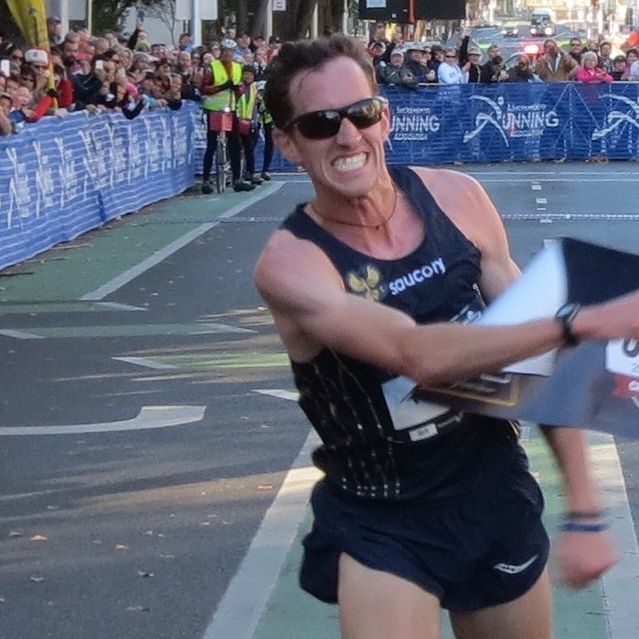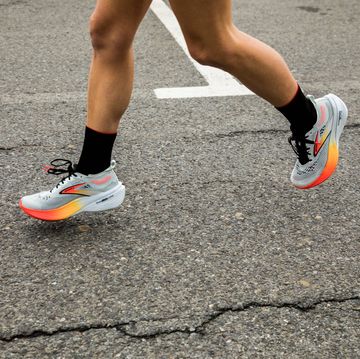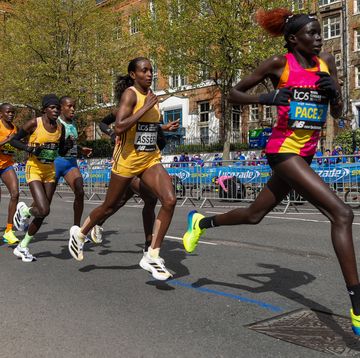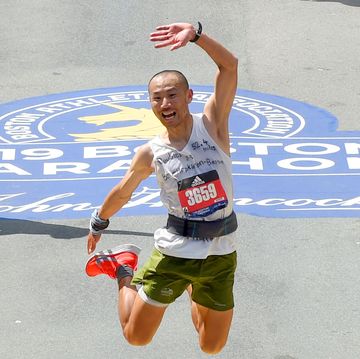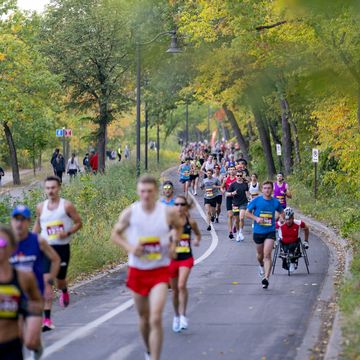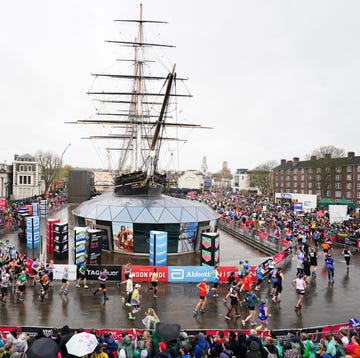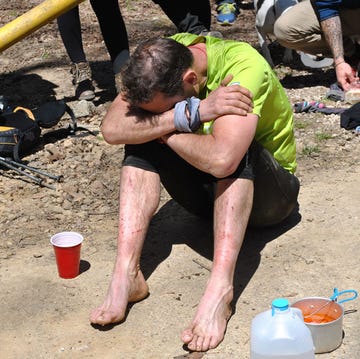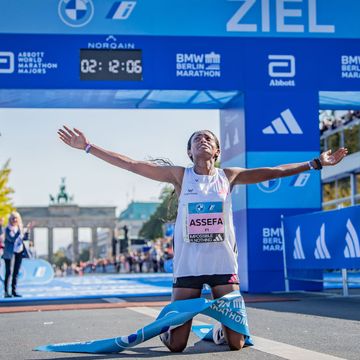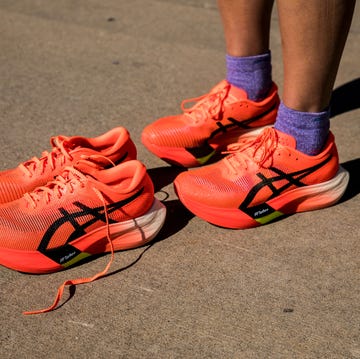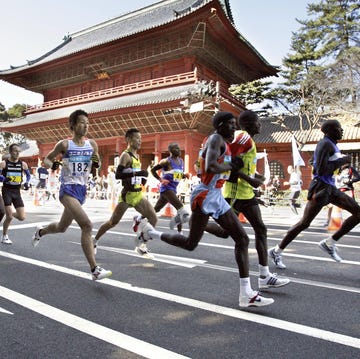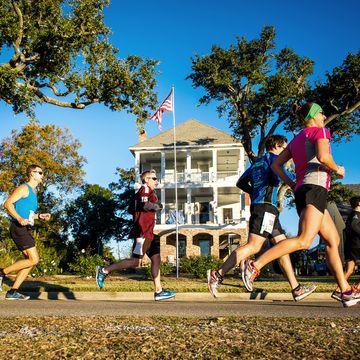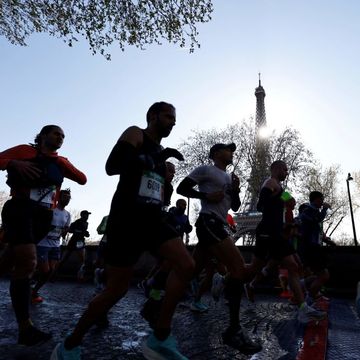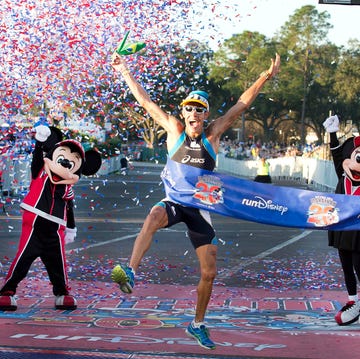Whatever they were serving at the water stations on Sunday at the California International Marathon (CIM), in Sacramento, we want some, please. Simply put, it was a phenomenal day to run 26.2 miles.
This year’s race doubled as the U.S. marathon championships, so competitors seized the opportunity for generous prize money and bonus incentives during a sunny, windless, cool day, on a course known for fast times. The rolling hills in the first 20 miles give way to a mostly flat final 10K and a total net-downhill route to the California state capitol.
Here’s how it went down, by the numbers:
1 national title, 2 marathons, and 5 weeks
Sara Hall, 34, decided after she ran a personal best of 2:27:21 at the Frankfurt Marathon five weeks ago that she wanted to compete at CIM and take a crack at her second U.S. championship title this season (she won the 10-mile race in early October).
On Sunday, Hall led the women’s race wire-to-wire and was on track at halfway to break a course record. She ultimately finished in 2:28:10, which was not a course record or a best time, but it was a national title and a $20,000 paycheck for placing first. She also became the first American to win a U.S. championship in the mile (2011) and the marathon, according to Race Results Weekly.
Roberta Groner, 39, from Randolph, New Jersey, was second in 2:30:38—her fastest marathon by six minutes. Carrie Dimoff, 34, of Portland, Oregon, was third in 2:30:54, a personal best by seven minutes.
16th place to first place in a 3-minute PR
Tim Ritchie, 30, from New Haven, Connecticut, hung out in the back of a chase pack and tried to stick to his own pace throughout much of the race. He was in 16th place at the halfway point, which he covered in 1:06:52, and started making up ground on the leaders after mile 20. He ran the second half in 1:05:04 to finish first in 2:11:56, a personal best by almost three minutes.
Ritchie was joined on the podium by runner-up Tyler McCandless from Boulder, Colorado, who finished in 2:12:28, and Kiya Dandena, of Flagstaff, Arizona, who was third in 2:12:56. Both men clocked their fastest marathon times.
87 qualifiers for the 2020 U.S. Olympic Marathon Trials
An exceptional number of men and women ran fast enough on Sunday to qualify for the 2020 U.S. Olympic Marathon Trials. (The date and location for the Trials have yet to be announced.)
In order to compete at the Trials, men must qualify by running the “A” standard of 2:15:00 or the “B” standard of 2:19:00 during the window spanning September 1, 2017 to January 19, 2020. The women’s “A” standard is 2:37:00 and the “B” standard is 2:45:00.
At CIM, 10 men broke the “A” standard and 27 men ran under the “B” standard. The women’s race saw 13 get the “A” and another 37 achieve the “B” standard. The athletes with the “A” qualifiers receive funding from U.S.A. Track & Field for travel expenses to the Trials.
For runners at this level, achieving the standard is a lifelong goal—akin to a Boston Marathon qualifier for many others. Below, Kris Lawrence of Virginia Beach, Virginia, expresses her excitement at achieving the Trials standard. She finished 31st in 2:42:42.
A $127,000 prize purse, plus bonuses
Each of the top 10 finishers was awarded prize money, from $20,000 for first place down to $500 for 10th place—the total purse for men and women was $127,000. But that wasn’t all. Those runners who qualified from the 2020 Olympic Trials also got paid. Athletes who clocked an “A” standard received $1,500 and athletes who ran the “B” standard got $500.
Another incentive for top 10 performers was the “bib displacement bonus.” For every bib number displaced by an athlete, the athlete received $100. For example, if an athlete wearing bib No. 7 finished in fourth place, she got $300.
2 wild turkeys and an aggressive debut marathon
For much of the race, the only creatures able to cross Parker Stinson’s path were two wild turkeys ignoring the road closures signs.
Stinson, 25, of Boulder, Colorado, ran his first marathon by dropping 4:56 and 4:53 first- and second-mile splits and maintaining a commanding lead—and aggressive pace—until about mile 18, when a few veterans began to gain on him. By mile 22, Stinson stopped to walk for a few seconds with pain in his abdomen. He finished 31st in 2:18:07, which is good enough to make the Olympic Trials.
After his first stab at a 26.2-mile race, Stinson was feeling just like the rest of us do.
